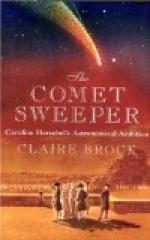|
This section contains 307 words (approx. 2 pages at 300 words per page) |
World of Scientific Discovery on Caroline Lucretia Herschel
Herschel grew up in a home where her father encouraged her learning, much to the displeasure of her mother, who believed girls should remain ignorant of everything except traditional skills like knitting. After her father's death in 1767, Herschel came under the oppressive control of her mother. Finally, in 1772, she left Germany to pursue a musical career in England, living with her brother, scientist William Herschel.
In England she trained to become a professional singer, but she also began to study mathematics under her brother's tutelage. William Herschel soon involved her in his hobby, astronomy. She helped him grind and polish mirrors for his telescope while copying catalogs and tables for his reference. When he discovered the planet Neptune in 1781, William Herschel was awarded a yearly stipend by George III that allowed him and his sister to pursue astronomy full time.
As she became more proficient with her own telescope, Caroline Herschel made a name for herself in this largely male domain. In 1783 she discovered three new nebulae and from 1786-1797 she discovered eight comets. George III awarded her a salary as well, a rare gesture at the time. She also took on a formidable task: she made a thorough index of the star catalog created by John Flamsteed (1646-1719), the first Royal Astronomer. This job called for perseverance, accuracy, and attention to details, all qualities in which she excelled.
Following her brother's death she returned to Hanover, Germany, but remained in close contact with her brother's son, astronomer John Herschel (1792-1871), for whom she compiled a new catalog of nebulae. Along with Scottish scientific writer Mary Somerville (1780-1872), Herschel became the first women to be awarded an honorary membership in the Royal Society. In spite of her inadequate training, she became a legend in her time and an important figure in the history of astronomy.
|
This section contains 307 words (approx. 2 pages at 300 words per page) |


